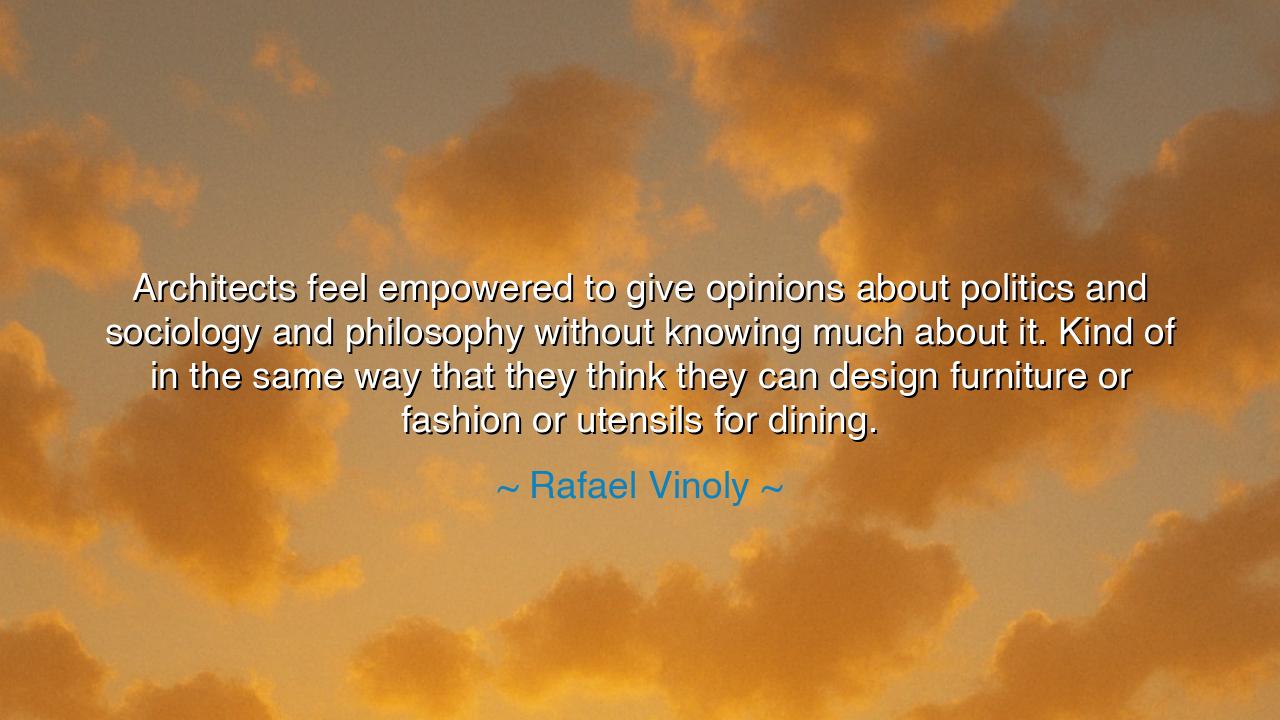
Architects feel empowered to give opinions about politics and
Architects feel empowered to give opinions about politics and sociology and philosophy without knowing much about it. Kind of in the same way that they think they can design furniture or fashion or utensils for dining.






“Architects feel empowered to give opinions about politics and sociology and philosophy without knowing much about it. Kind of in the same way that they think they can design furniture or fashion or utensils for dining.” – Rafael Viñoly
In this candid reflection, Rafael Viñoly, a master architect of the modern age, delivers a lesson that pierces beyond the walls of his own profession. His words speak not only to architects, but to all who wield knowledge, influence, and pride. For he warns of the temptation that arises when mastery in one field breeds arrogance in others — the belief that because one has learned to build towers of stone, one may also build towers of thought without foundation. Viñoly’s wisdom, though born from the discipline of design, echoes an ancient truth: that true mastery requires humility, and that one must not mistake excellence in one craft for understanding in all.
Throughout history, the great thinkers have spoken against this illusion of omniscience. Socrates, the father of philosophy, once declared that his wisdom lay in knowing that he knew nothing. The wise carpenter, the skilled sculptor, the poet, and the general — each understood the boundaries of their domain. But those who mistook their own talent for universal authority invited ruin. Viñoly’s words are thus a modern echo of the old admonition: that pride without knowledge is the architect of folly, and that the builder who designs without understanding collapses both his structure and his soul.
When Viñoly says that architects feel empowered to speak of politics, sociology, or philosophy, he is not condemning curiosity — for curiosity is the lifeblood of wisdom. He warns instead of pretension, of the danger that comes when one’s confidence outruns one’s comprehension. To speak on matters of the human spirit, of society, or of justice, requires more than eloquence or authority — it requires empathy, study, and lived experience. Yet how often do we see the learned mistake visibility for insight, mistaking their public stature for moral or intellectual depth? His words remind us that even the most brilliant designer may build castles in the air if he forgets the ground from which true knowledge must rise.
We see this lesson reflected in the story of Marcus Aurelius, the philosopher-king of Rome. Though emperor of the known world, Aurelius studied philosophy not to prove his superiority, but to temper his power with humility. He filled his journal, The Meditations, with reminders of his own ignorance, urging himself to remain a student before the vastness of truth. He understood that ruling a nation did not make him wise in the matters of the soul, and that even an emperor must kneel before knowledge. In this balance between authority and modesty lies the very essence of Viñoly’s teaching — that the moment we stop learning, we cease to build with purpose and begin to construct monuments to our own vanity.
And yet, Viñoly’s observation carries a certain irony — for architects, by the very nature of their craft, must dream beyond their blueprints. They build for people, for cities, for time itself; they must think of space, culture, and human behavior. But here, the master warns: dream deeply, but know your limits. For to imagine the city is noble, but to claim mastery over society is arrogance. The architect may shape the room where people gather, but not the hearts that gather there. To forget this is to confuse structure with substance, form with philosophy.
His words also mirror a wider truth of our age — an era where everyone feels entitled to speak on everything, where expertise is mocked and ignorance is paraded as authenticity. Viñoly’s warning, then, becomes a call for discipline of the mind: to know not only what one knows, but also what one does not. He invites us to rediscover the virtue of silence, to listen before speaking, to study before judging. For wisdom grows not from the noise of constant expression, but from the quiet labor of understanding.
So, let this be the lesson carried forward: respect the boundaries of your knowledge, yet always seek to expand them. Speak not as one who knows all things, but as one who strives to learn them. When you create, whether it is a building, a poem, or a life, let humility be your cornerstone. For even the grandest cathedral will crumble if built upon arrogance, but the humblest dwelling, raised upon understanding, will endure. In this balance — between knowing and not knowing, between mastery and wonder — lies the true art of being human.
And remember, as Viñoly teaches with both wit and warning: the wise do not build to impress, nor speak to be heard — they build to serve, and they speak to seek truth.






AAdministratorAdministrator
Welcome, honored guests. Please leave a comment, we will respond soon